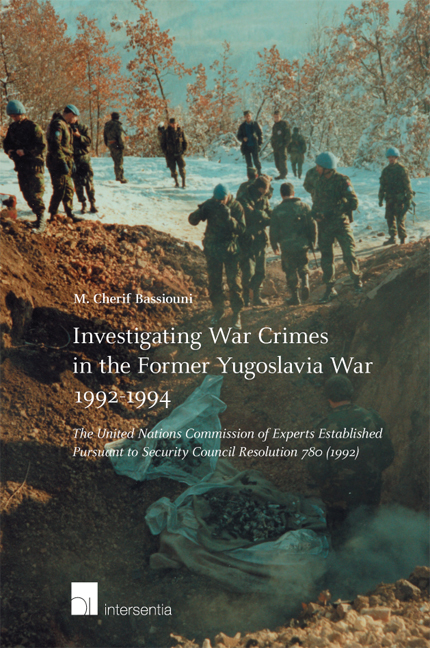 Investigating War Crimes in the Former Yugoslavia War 1992–1994
Investigating War Crimes in the Former Yugoslavia War 1992–1994 Book contents
- Frontmatter
- Contents
- Dedication
- About this Book
- About the Author
- Acknowledgement
- Table of Abbreviations
- Table of Authorities
- Chapter I Background on the Conflict in the Former Yugoslavia
- Chapter II Some Pictorial Descriptions
- Chapter III An Overview of the Realpolitik and the Workings of the Commission of Experts
- Chapter IV Precedents Leading to United Nations Security Council Resolution 780 (1992)
- Chapter V The Commission of Experts’ Establishment and Processes
- Chapter VI Final Report of the Commission of Experts Established Pursuant to Security Council Resolution 780 (1992) and Annex Summaries and Conclusions
- Chapter VII The Absence of a Transition between the Commission of Experts and the ICTY
- Chapter VIII Experiences that Affected Me the Most During My Tenure on the Commission of Experts
- Chapter IX Concluding Reflections
Chapter III - An Overview of the Realpolitik and the Workings of the Commission of Experts
Published online by Cambridge University Press: 12 October 2018
- Frontmatter
- Contents
- Dedication
- About this Book
- About the Author
- Acknowledgement
- Table of Abbreviations
- Table of Authorities
- Chapter I Background on the Conflict in the Former Yugoslavia
- Chapter II Some Pictorial Descriptions
- Chapter III An Overview of the Realpolitik and the Workings of the Commission of Experts
- Chapter IV Precedents Leading to United Nations Security Council Resolution 780 (1992)
- Chapter V The Commission of Experts’ Establishment and Processes
- Chapter VI Final Report of the Commission of Experts Established Pursuant to Security Council Resolution 780 (1992) and Annex Summaries and Conclusions
- Chapter VII The Absence of a Transition between the Commission of Experts and the ICTY
- Chapter VIII Experiences that Affected Me the Most During My Tenure on the Commission of Experts
- Chapter IX Concluding Reflections
Summary
William Shakespeare foretold that what's past is prologue, but for many people today, history is becoming less relevant. Especially for many Millennials and those born after them, what matters to them is the present, what is happening today, right now, this second. And so even though by losing sight of the past we risk repeating our mistakes, for many in today's global society, the value and benefits of looking back are eroding. Moreover, the Millennial generation creates its own reality through social media and other means of instant communication. And so, just as instantly as something arises, it can instantly disappear. In many ways, the failure of the international community to remember or take heed of the past allowed the atrocities and human suffering to occur in the conflict in the former Yugoslavia. In the same way, it appears that the contemporary international community has lost sight of all that was learned in the Balkan conflict (1991–1994) and continues to make the same mistakes in regards to conflicts taking place today and now.
HISTORICAL INTERNATIONAL PRECEDENTS
The application of international criminal law (ICL) and international criminal justice (ICJ) measures to the conflict in the former Yugoslavia were inspired and based on ICL and ICJ initiatives of the past, though many have lost sight of the specifics of these historical precedents. Today, entire historical periods are encapsulated in a single word, branded like a product on a supermarket shelf. Thus the varied and extraordinary international criminal justice developments following World War Two have all been synthesized, in general and specialized literature, into one word: “Nuremberg.” This brand name now covers the International Military Tribunal (IMT) at Nuremberg, the International Military Tribunal for the Far East (IMTFE) at Tokyo, prosecutions under Allied Control Council Law No. 10, and national prosecutions in various states throughout the world. Exactly how these tribunals and prosecutions came about; how these institutions functioned (including how their leaders dealt with political and practical obstacles and what compromises they had to make to get results), and what their legacy has been are just some of the ICJ history lessons we are losing. And that explains why we are making the same mistakes, perhaps most shockingly letting political considerations influence ICJ by using the same techniques of United Nations bureaucracy and funding that have caused problems in the past.
- Type
- Chapter
- Information
- Investigating War Crimes in the Former Yugoslavia War 1992–1994The United Nations Commission of Experts Established Pursuant to Security Council Resolution 780 (1992), pp. 87 - 118Publisher: IntersentiaPrint publication year: 2017
